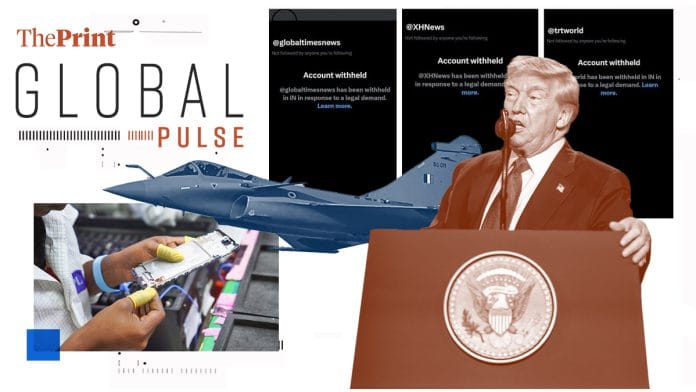New Delhi: The Indian government has denied US President Donald Trump’s claim. India and Pakistan did not agree to a ceasefire due to his offering of “trade concessions”, reports the Associated Press.
The issue of trade didn’t come up in any of these discussions, foreign ministry spokesperson Randhir Jaiswal said this week. “Trump said he not only helped mediate the ceasefire, but also offered mediation over the simmering dispute in Kashmir, a Himalayan region that both India and Pakistan claim in entirety but administer in parts,” reports Rajesh Roy.
However, India has declined that offer.
Meanwhile, foreign policy and national security expert Lisa Curtis says Donald Trump should exercise caution when it comes to India and Pakistan’s “underlying” affairs, particularly in Kashmir.
Writing in Foreign Affairs, she says, “There is a tremendous difference between getting the two countries to step back from the brink of war and facilitating a permanent solution to an 80-year dispute. The former is something Washington has, historically, done well. But the latter is something only India and Pakistan can accomplish.”
The Financial Times reports on another one of the US president’s seemingly unpredictable statements. While in Doha, Trump slammed Apple’s plan to produce iPhones in India, telling CEO Tim Cook: “We are treating you really good, we put up with all the plants you built in China for years. We are not interested in you building in India.”
“India’s one of the highest-tariff nations in the world, it’s very hard to sell into India,” FT further quotes Trump as saying. “They’ve offered us a deal where basically they’re willing to literally charge us no tariff . . . they’re the highest and now they’re saying no tariff.”
The two countries are negotiating a “bilateral trade agreement, the first tranche of which they say they will be agreed by autumn”, Tim Bradshaw and John Reed report for the FT. While Trump and Modi are “ideologically aligned and personally friendly,” India’s high tariffs have emerged as a “point of friction”.
The Economist reports on Pakistan’s claims that its advanced Chinese-made J-10C fighter jets and PL-15 missiles “prevailed” in the face of Western combat weaponry—including France’s Rafale.
“The claims have grave implications for India. It has modernised its forces in the past decade by buying 62 Rafales and is considering buying more. Pakistan, meanwhile, has added 150 JF-17 fighters, most jointly made with China, since 2007 and has bought 20 J-10Cs since 2022,” the magazine notes.
This is also a reason for alarm for the US and its allies—the J-10C could feature in any future war over Taiwan. However, The Economist adds, “Even if Pakistan’s claim is confirmed, that would not prove the J-10C’s superiority over the Rafale or other Western aircraft, many of which can perform a wider variety of missions.”
“Still, military officials around the world are scrambling for more details and, in some cases, preparing to update war plans.”
The Guardian’s Helen Davidson reports on India blocking X accounts. On Wednesday, India blocked the official accounts of the Chinese “nationalistic tabloid” The Global Times, as well as that of state agency Xinhua.
“India has targeted thousands of social media accounts in the last week, including a number of reputable media outlets and reporters, sparking criticism from press freedom groups. It’s not known if the blocking of the Global Times, Xinhua, and TRT are part of the same crackdown. X, formerly Twitter, is banned inside China,” the report says, noting that the move comes following China’s announcement of renaming certain territories in the state of Arunachal Pradesh.
Access to the accounts has since been restored.
(Edited by Sanya Mathur)
Also Read: Spinning peace à la Trump & satellite imagery the ultimate truth teller in India-Pakistan flare up






